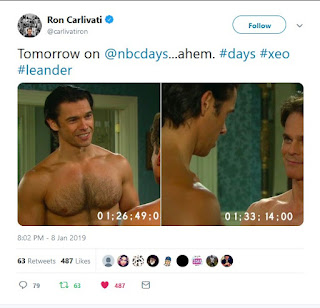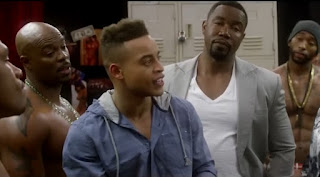Movie Review - Hunter Gatherer (Portland Film Festival)
Writer-director Joshua Locy's film has a middle-age, African-American man, maybe in his mid to late forties who's been gone for a while, but now he's back and he's trying to get his life back. It's never said directly but the implication was that he was in prison. Now that he's released, he's staying with his mother but he wants his estranged girlfriend back, as well as some kind of business. With limited opportunities, he becomes a bit of a scavenger, rummaging through metallic junk. In the process, he encounters another kind of scavenger, another African-American, a bit younger, with whom he builds a bond that might be deeper than he expected or even wanted.
Andre Royo (The Wire and Empire) stars as Ashley Douglas, the possible parolee who is very talkative and charming. He comes across as a failed, con-man or a bit of a hustler who acts like he came-of-age in the late 70's. He might not be that old because he's in great shape with a nice, full head of hair that's slicked back. He's also vibrant and sexy.
George Sample III co-stars as Jeremy Pittman, a skinny, almost emaciated guy, probably in his thirties, maybe younger, also African-American. He lives with his grandfather in a nursing home. He doesn't seem to have a traditional job, or at least Locy doesn't show us one. Jeremy makes his money by being a test subject for medical products. He's essentially a lab rat, or guinea pig.
The relationship between Ashley and Jeremy is as central as any other relationship that Ashley has. Yet, he probably wouldn't agree because he's not conscious of it. Ashley is more focused on getting his ex-girlfriend back. Unfortunately, she has a new boyfriend and wants nothing more to do with Ashley. In the meantime, he spends time with Nat, played by Kellee Stewart. Nat is Jeremy's aunt and a beautiful woman in her own right.
Ashley makes no secret though about the fact that Nat is just a placeholder and that he's really just using her. He doesn't say it outright, but he's also using Jeremy. Every encounter that Ashley has with Jeremy is about how Jeremy can do something for him. Of course, the redemptive moment would be Ashley finally doing something for Jeremy, motivated by the climax of Ashley's delusion being shattered about his future with his ex-girlfriend.
However, Locy's film turns toward the surreal for that redemptive moment. It confuses as to the redemption being either real or imagined. Perhaps, this is Locy's point that redemptive moments for characters such as these, or black men in these positions can only happen in the surreal, which is a sad commentary indeed.
Four Stars out of Five.
Not Rated but for mature audiences.
Running Time: 1 hr. and 28 mins.
Andre Royo (The Wire and Empire) stars as Ashley Douglas, the possible parolee who is very talkative and charming. He comes across as a failed, con-man or a bit of a hustler who acts like he came-of-age in the late 70's. He might not be that old because he's in great shape with a nice, full head of hair that's slicked back. He's also vibrant and sexy.
George Sample III co-stars as Jeremy Pittman, a skinny, almost emaciated guy, probably in his thirties, maybe younger, also African-American. He lives with his grandfather in a nursing home. He doesn't seem to have a traditional job, or at least Locy doesn't show us one. Jeremy makes his money by being a test subject for medical products. He's essentially a lab rat, or guinea pig.
The relationship between Ashley and Jeremy is as central as any other relationship that Ashley has. Yet, he probably wouldn't agree because he's not conscious of it. Ashley is more focused on getting his ex-girlfriend back. Unfortunately, she has a new boyfriend and wants nothing more to do with Ashley. In the meantime, he spends time with Nat, played by Kellee Stewart. Nat is Jeremy's aunt and a beautiful woman in her own right.
Ashley makes no secret though about the fact that Nat is just a placeholder and that he's really just using her. He doesn't say it outright, but he's also using Jeremy. Every encounter that Ashley has with Jeremy is about how Jeremy can do something for him. Of course, the redemptive moment would be Ashley finally doing something for Jeremy, motivated by the climax of Ashley's delusion being shattered about his future with his ex-girlfriend.
However, Locy's film turns toward the surreal for that redemptive moment. It confuses as to the redemption being either real or imagined. Perhaps, this is Locy's point that redemptive moments for characters such as these, or black men in these positions can only happen in the surreal, which is a sad commentary indeed.
Four Stars out of Five.
Not Rated but for mature audiences.
Running Time: 1 hr. and 28 mins.











En Son Çıkan Perde Modelleri
ReplyDeleteSms onay
mobil ödeme bozdurma
nft nasıl alınır
ankara evden eve nakliyat
trafik sigortası
dedektör
web sitesi kurma
aşk kitapları
Smm panel
ReplyDeletesmm panel
iş ilanları
İNSTAGRAM TAKİPÇİ SATIN AL
HIRDAVATÇI
Beyazesyateknikservisi.com.tr
servis
JETON HİLESİ
شركة مكافحة حشرات بالقصيم
ReplyDeleteشركة مكافحة حشرات بالاحساء